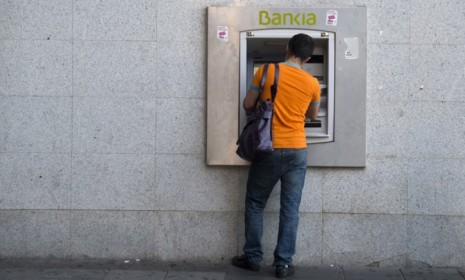Spain's looming $24 billion bank bailout: 5 takeaways
In the latest calamity for the eurozone, Spain veers toward a full-blown banking crisis as a massive financial institution asks for billions in aid

A free daily email with the biggest news stories of the day – and the best features from TheWeek.com
You are now subscribed
Your newsletter sign-up was successful
Europe's debt crisis is on the verge of spiraling out of control. Bankia, Spain's third-largest bank, has requested an additional 19 billion euros ($24 billion) in rescue funds to prevent collapse, sparking concerns that the continent's fourth-largest economy may soon need a bailout of its own. The interest rate on 10-year Spanish bonds climbed to 6.5 percent on Monday, just below the unaffordable levels that in the past catalyzed bailouts for Greece, Portugal, and Ireland. Spanish Prime Minister Mariano Rajoy says Spanish banks do not need a European rescue, but most analysts fear the country itself will need some kind of neighborly assistance. Here, five key takeaways:
1. Spain's banks are crumbling
Unlike Greece, which saw its borrowing costs rise due to profligate spending, Spain has been hit "by an out-of-control housing boom and bust that is now menacing its banking system," says Ruth Sunderland at Britain's Daily Mail. Spain already effectively nationalized Bankia and gave it a bailout of 4.5 billion euros, but the bank's assets — many of them outstanding mortgages and other loans — continue to plummet in value as Spain's double-dip recession drags on. Spain's other banks are probably just as soaked with bad assets, and Bankia's tumble could spark a wave of bailout requests, turning the country's financial industry into a bunch of "zombie banks."
The Week
Escape your echo chamber. Get the facts behind the news, plus analysis from multiple perspectives.

Sign up for The Week's Free Newsletters
From our morning news briefing to a weekly Good News Newsletter, get the best of The Week delivered directly to your inbox.
From our morning news briefing to a weekly Good News Newsletter, get the best of The Week delivered directly to your inbox.
2. Spain's government is out of money
Spain has a bank bailout fund, but it has dwindled to 5 billion euros. That means Spain — already extremely strapped for cash — would have to borrow money to prop up Bankia. Spanish officials floated the idea of using government bonds, instead of cash, to bail out the bank, but that unnerved investors. "Telling people you're worried about raising 19 billion euros in the market is idiotic," an unnamed investor tells Britain's The Financial Times. It sends the signal that the country's creditworthiness is shaky and that it needs help from its European partners.
3. Bankia's failure could spark a bank run
"Failure to rescue Bankia could turn the trickle of domestic money leaving Spain into a full-fledged flight," says Raphael Minder at The New York Times. Spain's bond market troubles are already causing borrowing costs to rise for other debt-saddled countries, and a bank run could cause panic and more insecurity in the European financial system. Switzerland, which does not use the euro, is "considering new controls to stop a destabilizing inflow of foreign currency into the country," says Minder.
A free daily email with the biggest news stories of the day – and the best features from TheWeek.com
4. A bailout for Spain might be too costly
The euro currency bloc might be able to survive an exit by Greece, a relatively small economy that has turned out to be a fiscal problem child. But it can't "withstand a meltdown in Madrid," says Sunderland. Spain's economy is simply too big. Rajoy has suggested that the European Central Bank could buy bonds indirectly from Spain and other embattled countries to bring down borrowing costs, but the ECB has so far balked at the idea.
5. Greece is not unique
Europe is holding on to the "fragile reed of hope" that Greece's ongoing debt problems are unique, says Walter Russell Mead at The American Interest. European leaders are hoping to "tiptoe past a Greek meltdown and still hold together." Spain's problems show that the debt crisis has spread, and that the euro, an "'unsinkable' ship launched with such fanfare and so much acclaim, is headed toward an iceberg and that it is too late to turn."
-
 The environmental cost of GLP-1s
The environmental cost of GLP-1sThe explainer Producing the drugs is a dirty process
-
 Nuuk becomes ground zero for Greenland’s diplomatic straits
Nuuk becomes ground zero for Greenland’s diplomatic straitsIN THE SPOTLIGHT A flurry of new consular activity in Nuuk shows how important Greenland has become to Europeans’ anxiety about American imperialism
-
 ‘This is something that happens all too often’
‘This is something that happens all too often’Instant Opinion Opinion, comment and editorials of the day